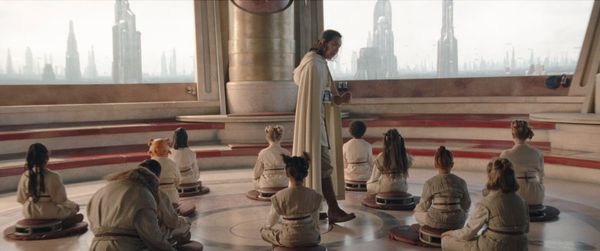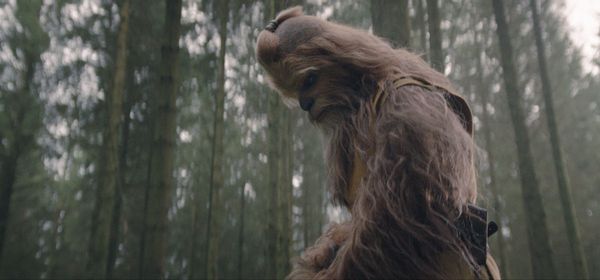
Veiling the “Star Wars: The Acolyte” in question marks until shortly before its premiere is one of the smartest moves Disney+ could have made. The world knew it was coming since 2020 when the studio described it as "a mystery-thriller that will take viewers into a galaxy of shadowy secrets and emerging dark-side powers in the final days of the High Republic era."
Obscuring most details about the show was a gamble. The lackluster “Ahsoka,” which followed the so-so “Obi-Wan Kenobi” and the entirely unnecessary “Book of Boba Fett,” taught the audience to keep expectations low.
Then Disney released commercials with Carrie-Anne Moss slicing through the air in full “Matrix” balletic glory. Trinity, as Jedi Master Indara, wielder of “Force-fu”! The ads showed just enough of Moss confronting a masked assailant with absolute precision to sell us on this new, Skywalker-free story — a brilliant play.
Maybe not as genius as killing her off in the premiere’s cold open.

Not everyone appreciates the misdirection — especially people expecting “The Acolyte” to give them a “Star Wars” version of their red pill dream queen. Discovering that it is not about Indara but her assassin Mae, played by Amandla Stenberg – and the assassin’s twin sister Osha, also Stenberg, and Sol, a Jedi Master played by “Squid Game” star Lee Jung-jae – must have bruised some feelings.
Be assured that “Acolyte” creator and showrunner Leslye Headland wasn't trying to trigger a No Girls Allowed clubhouse. She told Entertainment Weekly that she was striving to match the shock of the “Breaking Bad” opener, widely accepted as one of the best TV series introductions of all time. Offing the figure played by the most recognizable name in one's cast is nothing if not audacious.
Headland also had to know this choice would be polarizing. But all that demonstrates her confidence in both the story and the audience, placing faith in knowing reasonable viewers might tune in out of fan curiosity and stick around for the story. Moss is a superb Trojan horse leading people into a “Star Wars” show that breaks from the usual pattern in many respects, including making the franchise's first Asian Jedi master its lead.
“The Acolyte” bait and switch joins a list of shows revered among children of the '80s whose creators ventured away from old and outdated lore. “Masters of the Universe” and “Mad Max: Fury Road” lured their primarily male fandoms into their vehicles only to reveal that women are the plot's drivers.
“Masters of the Universe” committed an especially egregious crime by appearing to kill off its sword-swinging He-Man in its 2021 “Revelation” arc, making the first five episodes mainly about Teela, who Gen X man-children knew as his battle support and squeeze.
The revival's creator Kevin Smith reshapes Teela as a capable warrior in her own right; casting “Buffy” star Sarah Michelle Gellar to voice the role sharpens that point. But longtime He-Man fans resented that slant, coming around only once they were assured their favorite action figure hadn’t been replaced by a girl.
“Fury Road” enraged men’s rights goons in 2015 by dangling the expectation of seeing Tom Hardy continue Mel Gibson's outback rampage, only to grant deeper development to Charlize Theron’s Furiosa and the other women with her. When “Furiosa: A Mad Max Saga” was released, everyone knew what they were getting. Most who have seen it gave it high marks.
Similar to the fuming that arose around Mattel’s tiniest bodybuilder, those crying “feminism” or “woke” now pretend to find no pleasure in George Miller’s impeccably orchestrated and jaw-dropping acrobatic action sequences, which is the main reason to see these flicks. When sexism or racism doesn’t factor in, guess what? They're a pretty good time.
“The Acolyte" is enduring the usual review bombing, which by now the average viewer should recognize and ignore. Disney+ shared a more telling enthusiasm metric with trades: the series racked up 4.8 million views within its first day of streaming. That's according to the company's internal data reported by The Wrap, which further defines a view as total stream time divided by runtime. The usual caveats about grains of salt apply.

But as a point of comparison, that’s more than the 4 million global views the critically acclaimed “X-Men ’97” racked up within its first five days.
Stenberg already weathered the menacing side of fantasy fandom when she was cast as Rue in 2012’s “The Hunger Games” stoking a small racist uprising among the too-much online. At the time that was somewhat unusual and alarming. Now, sadly, it’s an expected byproduct of any new Disney release featuring a person of color in a role that in the past would have been played by a white person or, in the case of most Jedi knights, a man.
The upset over Indara's demise shows some progress on that front; Daisy Ridley's Rey walked so Moss' Jedi Master could levitate, it seems.
It's also normal to be disappointed that we won’t get more of Moss in this series — in the present, I should say. Instead, we're treated to Lee demonstrating why he is one of South Korea’s biggest stars, and the dramatic breadth and variety Stenberg brings to her dual performance.
Indara’s death gives the plot ballast not because of who plays her but due to what the character represents. She’s the best among an elite few, and Stenberg’s Mae proves she’s better. If what came after their confrontation wasn’t engaging, none of this would matter.
"The Acolyte" revolves around characters lacking established histories, meaning we don’t know whether they’ll make it or how the story will end. And yes, placing Moss out front led us to believe something quite different about what this show would look like, but the rest of the cast maintains the tension established by her character's killing. Nothing is sure, and no one safe. That hasn’t happened with a “Star Wars” story in a long time.
New episodes of "The Acolyte" stream Tuesdays on Disney+.







